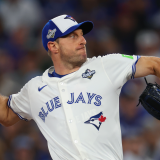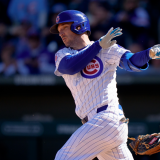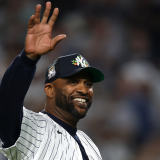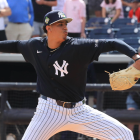First test showed little, but new replay system will work
Baseball began testing the proposed new replay system Tuesday night. The first test game showed little, but replay will work.
It's going to work.
Every game won't be nearly this smooth. Every call won't be nearly this easy.
But replay is going to work.
That wasn't exactly proven Tuesday night, in the first test run of baseball's proposed replay system. The umpires in the Arizona Fall League game between the Mesa Solar Sox and the Salt River Rafters didn't cooperate by missing any calls.
The managers, allowed and encouraged to challenge calls as often as possible, asked for four plays to be reviewed. All four calls seemed to be pretty clearly right on first glance, and all four were indeed confirmed by the major-league umpires watching from a television truck.
The longest delay was just over a minute, including the time for an attendant to bring a headset out to the home-plate umpire so he could confer with the replay umps.
There were no obvious glitches, no controversies.
But again, there were no apparent missed calls, either. Without replay, this was one of the many baseball games that would have passed without a single argument.
We just saw a whole bunch of those in the postseason, possibly the last major-league games ever to be played without extensive replay.
It's not an absolute given that the new replay system will be in effect on opening day. The major-league owners still need to approve (they should vote next week), the major-league players need to approve and the major-league umpires need to approve.
But know this: In principle, everyone supports replay.
The umpires want it, even though MLB refuses to let them say it publicly. They don't enjoy getting calls wrong, and they don't like it that everyone else knows what the replay shows and they don't.
The players hate to see blown calls, and the managers do, too. The managers may not love the challenge system, which will put more pressure on them, and there has been and will continue to be plenty of discussion of the details.
But replay is coming, and replay is going to work, a whole lot more often than it doesn't.
Many times, it's going to show exactly what Tuesday's four replays showed, that the umpire got the call right. These were fairly easy ones, but big-league umpires get most of the tough ones right, too.
Most of the time, it's not going to slow down the game, because as they proved Tuesday, a replay judgment can take a lot less time than an argument.
Tony La Russa, who has been heavily involved in setting up the new system, said on the MLB Network telecast that managers won't be allowed to ask for a replay if they first argue a call. Something will need to be done to keep them from stalling too much while they decide whether to challenge.
The number of allowable challenges remains to be settled, and MLB plans to try out different options during the AFL games this week.
"We still have areas that are a little fuzzy," La Russa admitted.
One option that has been discussed -- and should be adopted -- is the possibility of a crew-chief referral. In other words, if a manager is out of challenges, but there's a play where even the umpires can't be certain they were right, the crew chief should be allowed to refer the decision to replay himself.
If the goal is to get all the biggest calls right, that's absolutely necessary.
They will get more calls right. They can't get every one of them right, because there will be calls where there is no good camera angle, or where two camera angles give conflicting views, or because the blown call is on balls and strikes or a check swing, which quite rightly won't be subject to review.
It's going to work, as well as it worked Tuesday or even better.
It's going to work in games like this, where there really aren't any controversial calls. More importantly, it's going to work in a game where there's one or two that are obviously missed.
Now, they'll get them right.
It's going to work.
















